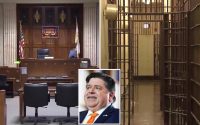Durham hits Nadler for trying to discredit Russiagate probe
Special counsel John Durham went after House Judiciary Committee ranking member Jerry Nadler (D-NY) Wednesday for accusing his team of “glaring investigative missteps” during its four-year probe of the FBI investigation into alleged collusion between former President Donald Trump’s 2016 campaign and Russia.
Durham, 73, singled out the Manhattan Democrat during his opening statement at a panel hearing, saying he and his colleagues “carried out our work in good faith, with integrity and in the spirit of following the facts wherever they lead without fear or favor” and that “the findings set forth in this report are serious and deserve attention from the American public and its representatives.”
“At no time and in no sense did we act with a purpose to further partisan political ends. To the extent that somebody suggests otherwise — that’s simply untrue and offensive,” he told the House panel of his 306-page report following Nadler’s opening remarks.
“For one, we found troubling violations of law and policy in the conduct of highly consequential investigations, directed at members of the presidential campaign, and ultimately a presidential administration,” Durham went on. “To me, it matters not whether it was a Republican campaign or a Democrat campaign. It was a presidential campaign.”

Nadler, 76, said in his opening remarks that the Durham probe — which found the FBI’s investigation of the Trump campaign was “seriously flawed” — was itself “a deeply flawed vessel” and “failed to uncover any wrongdoing.”
“It may be hard to remember, but at the outset of the Durham investigation, Mr. Durham was a well-respected career prosecutor with a solid reputation,” Nadler went on. “The attorney general is supposed to appoint the special counsel to prevent the appearance of politicization in a criminal investigation. Mr. Durham could well have lived up to that expectation. Instead, what we got was a political exercise that operated with ethical ambiguity and existed to perpetuate Donald Trump’s unfounded claims.”
Nadler also said Durham’s report ignored “key evidence related to allegations of contact between the Trump campaign and the Russian government,” including a thumb drive of cell phone communications between the two and “questionable computer contacts between the Trump Organization and Alfa Bank.”


He added that it “also fails to recommend a single remedial measure that the Justice Department or the FBI might take … largely because the DOJ and FBI have already implemented the changes recommended by the inspector general three and a half years ago.”
The report, which was released May 15, did not recommend significant reforms but Durham met with leaders of the House Intelligence Committee in a closed-door meeting on Tuesday to express the need for changes at the FBI.
“It was interesting to hear from Mr. Durham, that he has concerns that there are reforms that need to go into place and then there are still issues that need to be addressed,” Intelligence Chairman Mike Turner (R-Ohio) told reporters after the meeting, noting that issues related to surveillance warrant applications were top of mind.
Durham pointed out in his opening statement that abuses of the Foreign Intelligence Surveillance Act led to charges for one former FBI agent and that others had “omitted references to what was clearly relevant and highly exculpatory information that should have been disclosed to the FISA court.”
“As our report details, the FBI was too willing to accept and use politically funded and uncorroborated opposition research such as the Steele dossier,” he told members of the Judiciary Committee.


